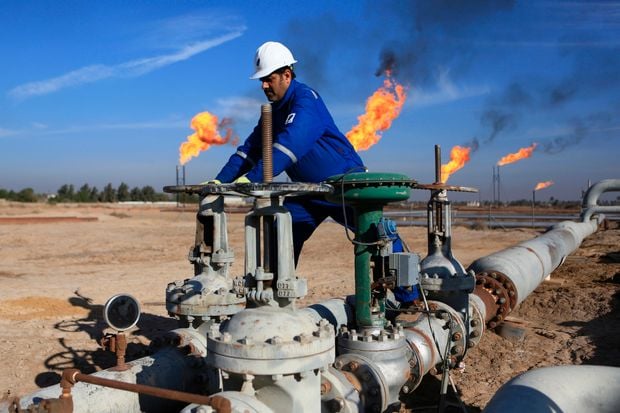Alwaght- The US President Donald Trump who has recently pushed the tensions with Iran to their height has now embarked on a policy of restricting Tehran's business and energy interactions with neighboring countries. In the latest move, he ended the waiver for Iraqi gas purchases from Iran, throttling the country's energy imports.
Earlier, Iraq had plans to import 5 billion cubic meters of gas from Turkmenistan via Iran, but the American pressures have hindered this plan, causing a serious new challenge to Baghdad.
The Iraqis were hopeful that through Turkmenistan deal they will diversify their energy sources, but the failure of this path has jeopardized Iraq's capability to meet its power needs at the height of the summer. Iran was not to receive transit fees for the gas going to Iraq from Turkmenistan through its territory, but it could consume at most 23 percent of this gas to meet its internal needs, something showing Iranians flexibility to help Iraq handle its energy needs.
Maximum pressure on Iran
Washington has taken this action as part of Trump's maximum-pressure campaign against Tehran, aiming to restrict Iran's revenue streams and ratchet up economic and financial pressure. The White House believes these measures can severely impact Iran's trade, energy supply, and economic stability, thereby diminishing its capacity for economic counter-measures.
Washington alleges that the income from gas sales to Iraq enables Iran to strengthen its military infrastructure. Consequently, the US intends to block all of Tehran's economic pathways to hinder the financing of its armed forces, the honing of its missile program, and the expansion of its regional influence.
At the same time, Washington seeks to cut Iraq's dependence on Iranian gas, which has supplied close to one-third of its power generation in recent years. Without these imports, Iraq's power grid will become unstable across many regions.
In past years, Iran has played a key role in helping Iraq manage its energy crisis by showing flexibility in gas deliveries and payment schedules. Even under international sanctions, Baghdad was able to make delayed debt payments. However, the revocation of the gas purchase waiver has now constrained this vital channel, putting Iraq face to face with the risk of energy shortages and widespread blackouts—a danger that Iraqi officials themselves acknowledge.
Adel Karim, an advisor to the Iraqi Prime Minister Mohammad Shia al-Sudani, has warned on this matter, saying: "If we lose Iranian gas, we will face a serious problem producing power." In a letter to the country's Trade Bank, Iraq's Ministry of Electricity stated that a failure to import gas could lead to extensive blackouts. Furthermore, Saad Faleh, the head of the fuel department at the ministry, said in May that "gas imports from Iran have dropped significantly, leading to a loss of approximately 3,500 megawatts from daily power generation capacity."
Washington has no alternative choice
While pushing to deprive Iraq of the Iranian gas, Washington does not have practical and immediate alternative to present to Baghdad, leaving Iraq in quest for new energy resources. One choice is Azerbaijan's gas that in recent months was entertained by the Iraqi officials.
Iran is, in fact, the optimal route for transporting gas from Baku to Iraq, but American sanctions have blocked this vital corridor. Consequently, the only remaining alternative path requires transit through Armenia, a route fraught with political and historical disputes between the involved nations that complicate its rapid utilization.
Even if these political hurdles are cleared, this new route cannot meet Iraq's urgent, short-term electricity needs and is considered only a long-term solution for reducing dependence on Iran.
In recent years, importing electricity from the Persian Gulf Arab monarchies has also been discussed as a potential option, but these plans have yet to be implemented, leaving Iran as Iraq's only immediate and reliable supplier. Furthermore, countries like Turkmenistan lack Iran's flexibility regarding debt settlement schedules; any delay or default could halt gas supplies, intensifying economic and social pressure on Baghdad and jeopardizing the energy security of its people.
Revenues for American companies
In this situation, the US puts forward the idea of producing gas in Kurdistan region's gas fields. This proposal is part of Washington-Erbil agreement on production in Khor Mor gas field. According to the agreement, American-French Schlumberger oil and gas company was to produce and supply gas in this field, but since Iraqi Supreme Court's ruling announced Kurdish emeghy sales without Baghdad's permission illegal, the company left the country three years ago.
Therefore, by pushing this proposal, the Trump administration aims to pave the way for American companies to re-enter Iraq's energy market and secure significant economic profits. With Iranian gas off the table and no immediate alternative available, Iraq will be forced to capitulate to Washington's demands to meet its own energy needs.
However, exploiting the fields in Kurdistan is a time-consuming process. Until a significant production level is achieved, Iraq will continue to grapple with energy shortages and a crippling electricity crisis. Consequently, the cancellation of the gas import waiver does little to help Iraq; instead, it intensifies the economic and political pressure on Baghdad and deepens the country's energy woes.
This situation highlights a stark contradiction: despite its claims of being an ally, Washington's actions are inconsistent with the obligations of a partner. In other words, its conduct bears a closer resemblance to that of an enemy than one considering Iraqi interests.
End of the gas waiver is expected to bring about substantial consequences and blackouts and disruption of industry and public services are only part of the crisis. So, no immediate and reliable alternative suppliers— be it Turkmenistan, Azerbaijan or Persian Gulf Arab states— cannot fill the vacuum caused by losing Iranian gas, something to sink Iraq into a serious energy crisis in the short run.



























